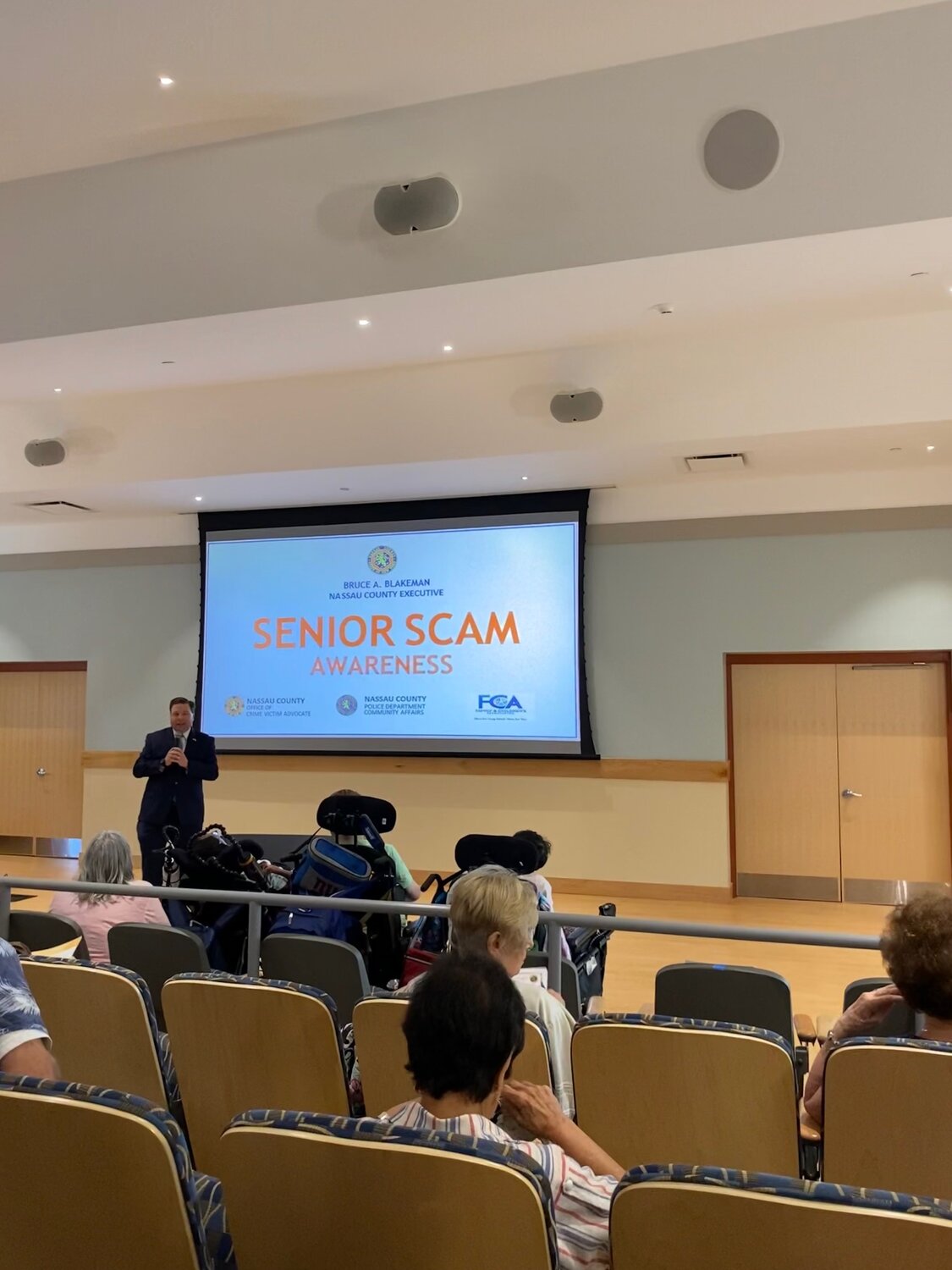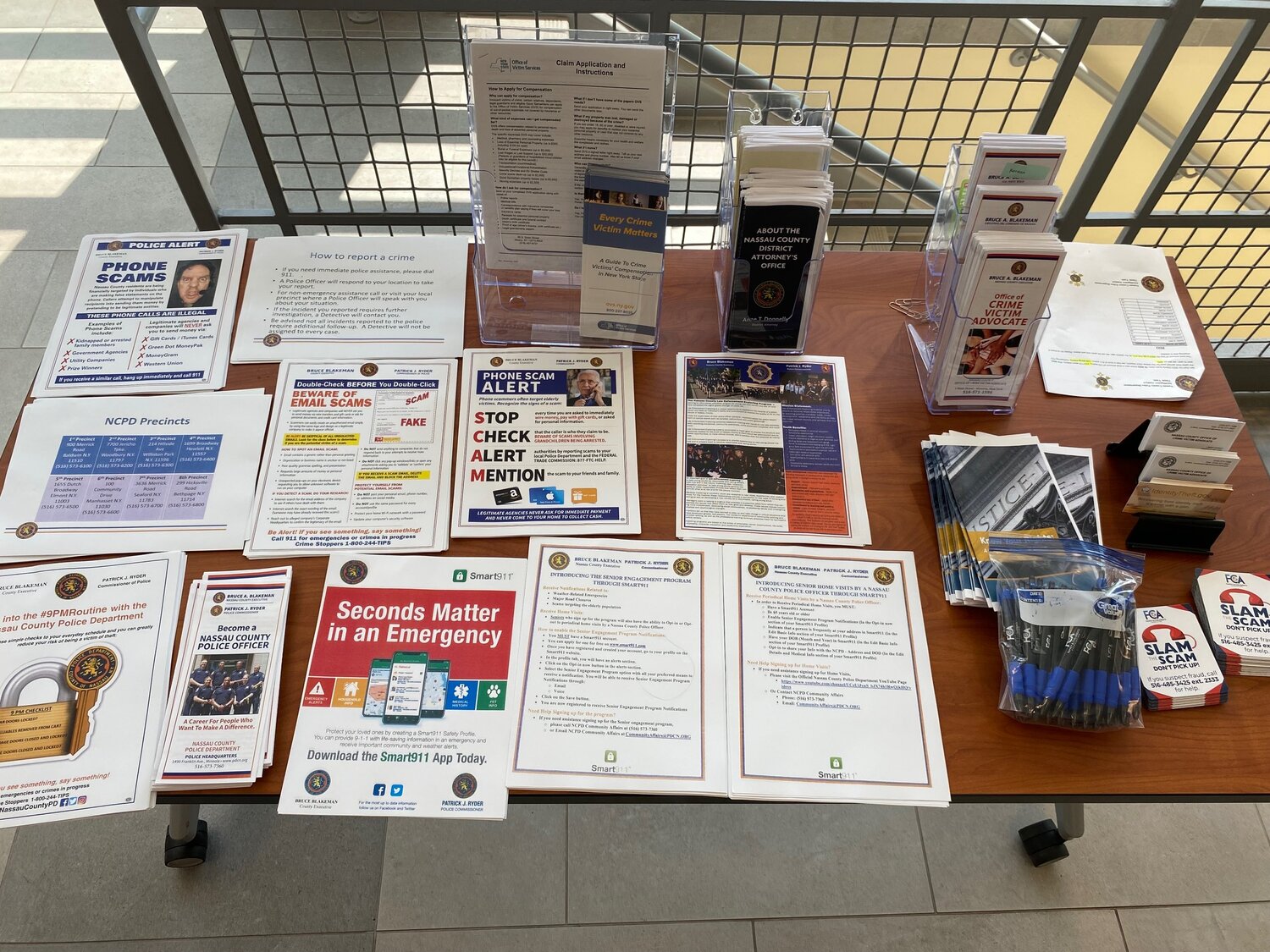Learning how to identify and report scams at the East Meadow Public Library
Scams of all varieties have found their way into the lives of many people, most notably seniors. Dozens of people gathered at the East Meadow Public Library on Aug. 9 to learn more about identifying scams, how to report being a victim of fraudulent activity, and how to seek reimbursement of money lost to a scam.
County Legislators Tom McKevitt and John Ferretti presented a seminar called “How to Avoid Scams,” alongside the Nassau Police Department’s Community Affairs office, the county’s Crime Victim Advocate office and the Office for the Aging, and the Family & Children’s Association.
The FCA is a nonprofit based in Garden City that offers a range of support services to vulnerable children, families, seniors and communities on Long Island. Its financial assistance branch offers information on scams.
In recent years, especially following the coronavirus lockdown, the county has reported increasing numbers of seniors targeted by phone and internet scams, according to McKevitt.
“Covid changed the world in many ways, particularly (for) seniors, people who previously may not have used the internet before, may not have used cellphones much before,” McKevitt said. “Now those criminals who are able to go hide behind the anonymity, instead of going to their front door, they’re able to do it behind the scenes, and seniors have more contact through those mechanisms than they did pre-Covid.”
Manda Kristal, of the Family & Children’s Association told the crowd that scammers either scare victims by convincing that a family member is in trouble, or excite them by leading them to believe that they are the recipient of a prize or award.
“They want to cut the cord that goes from your heart to your head,” Kristal said, “so that when you react, you’re reacting from your heart and you’re not using your head.”
She also said that scams will typically disguise themselves as coming from a credible source. She noted that in many instances, people will be asked to buy gift cards or share the number on the back of a gift card.
Kristal said its important to be skeptical of unfamiliar phone numbers, and advised seniors to have a password for family members to use if they are legitimately in danger, to avoid situations in which a scammer impersonates a relative’s voices and asks for money or information. She also said that if a person falls victim to a scam once, they are likely to be marked as a susceptible target in the future.
Eugene Messmer, a police officer with the NCPD’s Community Affairs office, discussed the importance of reporting scams to the local police department. Since last year, he said, there has been an 8 percent increase in the number of seniors impacted by fraud.
Messmer told the attendees about an app called Smart911 in which they can input personal information for emergencies. The app also allows seniors to receive drop-ins by local police officers if they opt to do so.
It’s “more or less just a well check,” Messmer said.
Scams can also be reported to the Nassau’s district attorney’s office as well as to the Federal Trade Commission.
Nora Durand, deputy director of the Crime Victim Advocate office, also offered some useful tips to prevent scams. She recommended following up on suspicious activity if you believe you’re being scammed, as well as utilizing multiple passwords and two-step authorizations when accessing personal accounts. There are also insurance plans that can help in cases of theft, Durand added.
Scam victims can contact the state’s Office of Victim Services in order to get up to $100 compensation, Durand said, or possibly more for those in vulnerable groups. Go to NassauDA.org for more information.
“The scammers today are very sophisticated, and they’re businesslike,” Kristal said. “They’re global, and falling for a scam cuts across every educational background, every gender, every ethnicity, and you’re not alone if you have been scammed.”









